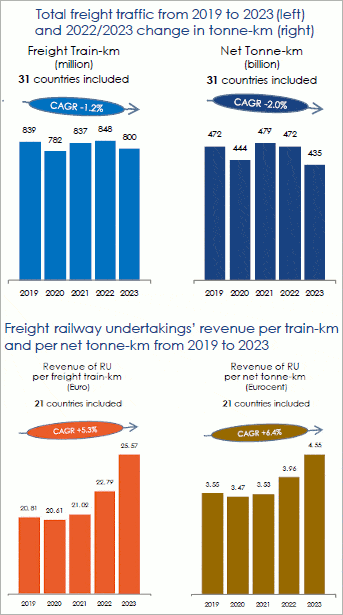
In the period 2019-2023, the share of new entrants in the sector
of European rail transport has risen from 33% in 2010
market at 40%. This was announced in the thirteenth report
of the Independent Regulators' Group Rail (IRG-Rail), the
formed by the regulatory bodies of the railway sector
of 31 European nations, specifying that this growth in the share of
of total market is part of a decline in volumes
total rail freight transport recorded in 2023.
 The document highlights, in fact, that in 2023 the market
was characterised by two scenarios
contrasting conditions: on the one hand, the demand for rail transport
increased significantly by +12%, compared to
year, thus exceeding the 2019 level,
while rail freight transport has suffered from the consequences
of the slowdown in the European economy and net tonne-km
decreased by -8% compared to 2022 due also to
the high incidence of infrastructure works and the high
competition of road transport.
The document highlights, in fact, that in 2023 the market
was characterised by two scenarios
contrasting conditions: on the one hand, the demand for rail transport
increased significantly by +12%, compared to
year, thus exceeding the 2019 level,
while rail freight transport has suffered from the consequences
of the slowdown in the European economy and net tonne-km
decreased by -8% compared to 2022 due also to
the high incidence of infrastructure works and the high
competition of road transport.
The document predicts that in the coming years the new entrants
will continue to increase their market share, while
incumbent operators such as DB Cargo and Hexafret (formerly SNCF Fret) will have to
reduce their activities due to the judgments on the matter
of competition. Growth will therefore be driven by
mainly by new entrants to the market and, consequently,
The attention of European politics must be increasingly focused
on how to support these companies to stay on the
market and grow.
In addition, the report notes that inflation in the member countries of
IRG-Rail remained high, standing at an average of 7%,
contributing to the increase in revenues of railway undertakings, in particular
for freight transport operators in a context of
Drop in freight traffic.